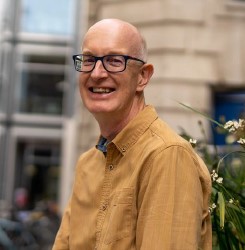The Annual William Fagg Lecture
Thursday 15 February 2024 at 6pm
Clore Centre, British Museum
Prof Michael W Scott, London School of Economics and Political Science
When is an Object? Insights from the Cumulative Lives of a Solomon Islands Canoe House Post
In May of 1936, an anthropomorphic wooden carving from the island of Owa Rafa in the southeast Solomon Islands appeared in Paris, ensconced in the garden of the art dealer and collector, Charles Ratton. As documented in a photograph made by the artist Man Ray, the figure shared this garden with Lunar Asparagus, a statue in bronze by Max Ernst, and was part of an installation described by its organizers as ‘A Surrealist Exposition of Objects’. This ‘exposition’, which filled Ratton’s house gallery, was one of many assemblages by the Surrealists that brought artefacts from Africa, Oceania, and the Americas together with randomly found objects, curios, antiquities, and recent works of art. For the Surrealists, such exhibitions aimed to mimic the collision of incongruous objects seen in Parisian flea markets and bazaars where, as the poet André Breton put it, ‘objects…go off to dream.’ Shorn of their previous external relations, that is to say, decontextualized objects encounter one another in ways that elicit their capacities to morph into new and surprising objects – to become other than what they were before. By orchestrating such encounters, the Surrealists sought to manifest what Breton called ‘the marvellous’ and to foster the onto-generative dreaming of new objects out of old.
Unlike most anthropologists and museum professionals – such as William Fagg himself – the Surrealists did not ask, ‘But what did this carving mean in its original context? Who made it and why? What purpose did it serve in the time and place of its first making? Such questions, the Surrealists thought, only fossilized objects in static pasts and denied their intrinsic and living mutability, their potential to exceed themselves continuously in new sets of relations. Prof. Scott’s lecture shows how these two ways of engaging with the carving that made its way from Solomon Islands to Ratton’s garden turn out to be transformations of the same methodology: dreaming through myriad juxtapositions and associations. Informed by a remarkable sequence of unrelated photographs that captured this carving at different moments in its life, he traces its transformations from early twentieth-century Owa Rafa to the present, prompting the question, When is an object? When does an object cease to be what it was before and acquire a new identity? What becomes of its old identities? And how might the descendants of the people who made and knew this sculpture over a hundred years ago redream it for themselves today?
The event is free, but places must be booked. RSVP to Helen Anderson HAnderson@britishmuseum.org
Location: Clore Centre
British Museum
Great Russell Street
London
WC1B 3DG
United Kingdom


